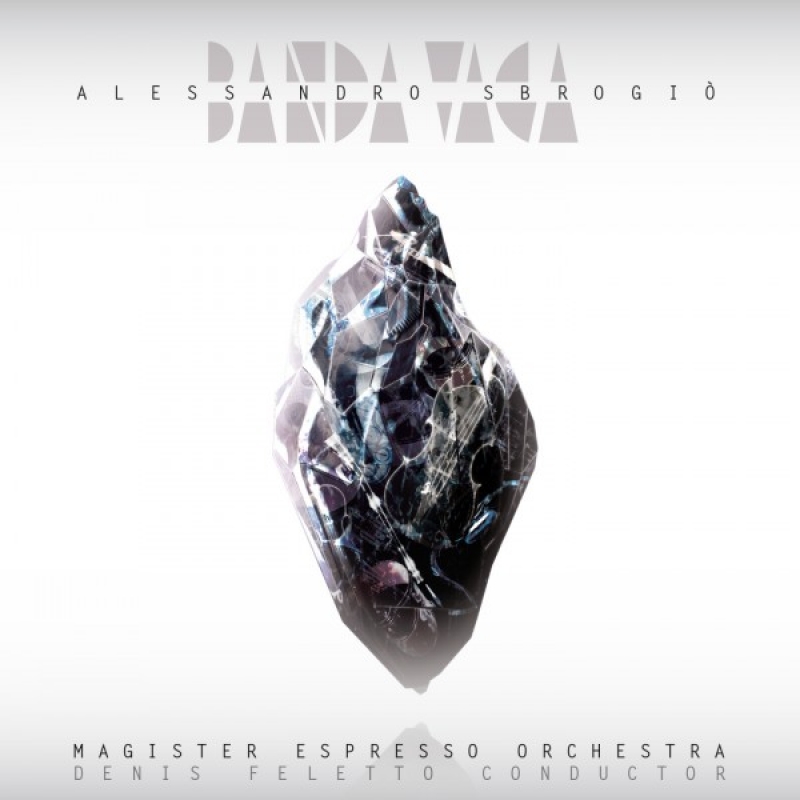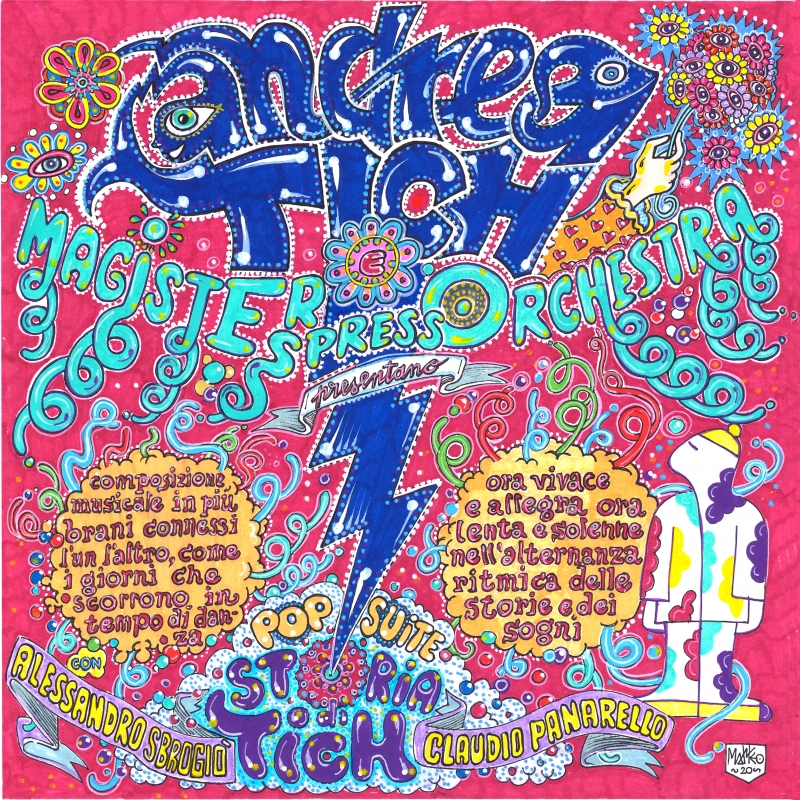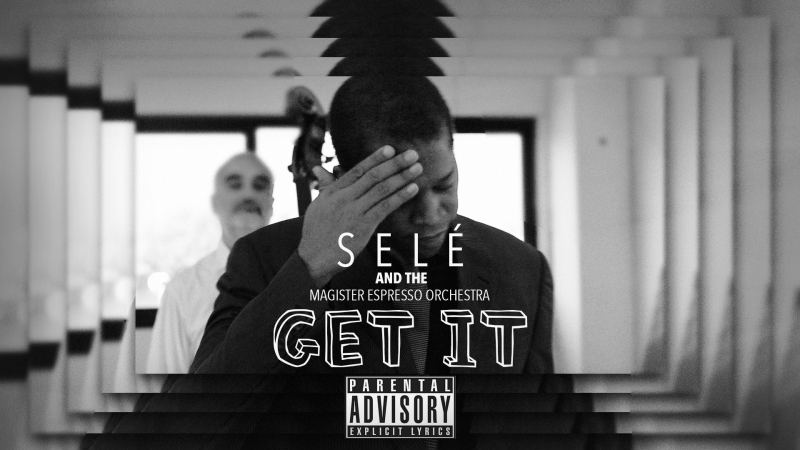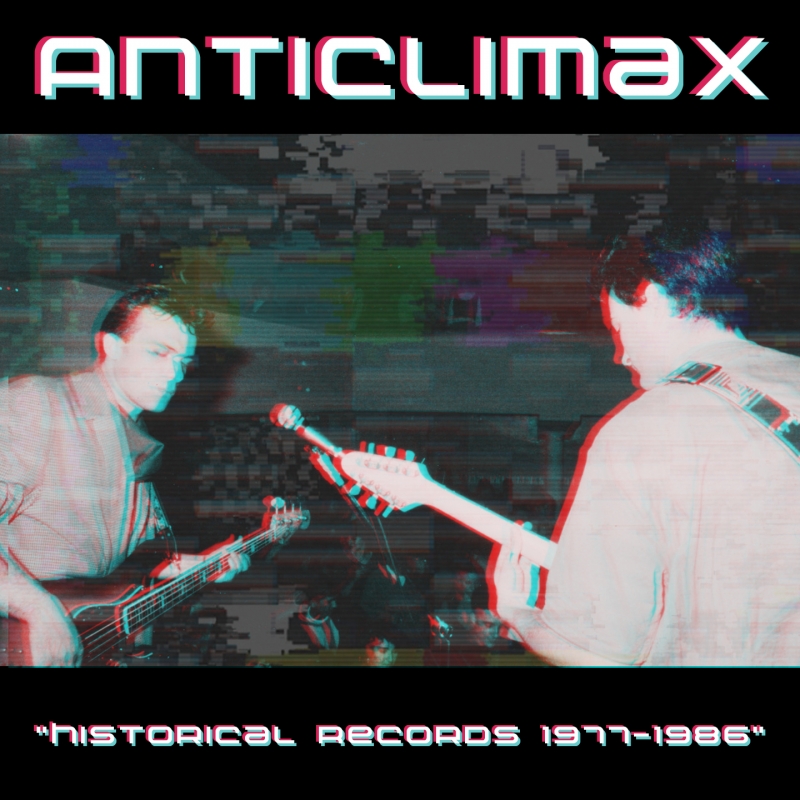
Discografia

Banda Vaga
-
Sono consapevole che il mercato discografico poteva fare a meno di una mia produzione, ma non ho resistito alla tentazione di provare le potenzialità espressive della Magister Espresso Orchestra.
L’ensemble che, insieme a Andrea Valfrè, Luca Mares e Denis Feletto, abbiamo pensato di creare, coinvolgendo tanti amici strumentisti, provenienti dalle più diverse esperienze musicali.
Si tratta di nove brani che avevo nel cassetto da quando ho smesso di andare in giro per il mondo a suonare con la Venice Baroque Orchestra. Nel cassetto sarebbero rimasti non fosse stato per l’incoraggiamento e l’entusiasmo di Davide Ragazzoni, che poi mi ha onorato della sua partecipazione alla batteria e alle percussioni.
Per non parlare dell’apporto di tutti gli eccezionali strumentisti che generosamente si sono prestati al tentativo di creare una formazione eclettica, via di mezzo fra l’orchestra tradizionale e la big band, che spero possa collaborare con tanti altri compositori negli anni a venire.
Al termine di questa avventura ho imparato un sacco di cose e ovviamente adesso farei un lavoro migliore, ma per le ferree leggi dei tempi e del budget, il rewind non è ammesso.
A mio padre, che in quanto a musica era di bocca buona, sarebbe certamente piaciuto e a lui voglio dedicarlo.
-
I am aware my production was not needed by the music industry, nevertheless I could not resist the temptation to test the Magister Espresso Orchestra, the ensemble Andrea Valfrè, Luca Mares, Denis Feletto and I have decided to set up, involving many musician friends, coming from the most various music experiences.
It is a nine music pieces record, my long-cherished dream dating back to when I stopped touring the world with the Venice Baroque Orchestra.
Those pieces would have remained a dream unless I had received encouragement and enthusiasm from Davide Ragazzoni, who has eventually honored me playing drums and percussions on the record. Not to mention the contribution given by all the instrumentalists who have generously participated to the endeavour to create an eclectic ensemble, halfway between the traditional orchestra and the big band, that I hope can work with many other composers in the coming years.
Lessons learned at the end of this adventure of course could make me do a better work now, but due to strict time and budget laws, no rewind is allowed.
My father, with his easily satisfiable music demands, would have really appreciated this work that I want to dedicate to him.

Storia di Tich - Pop Suite
-
Andrea Tich - Claudio Panarello - Alessandro Sbrogiò e Magister Espresso Orchestra.
-

GET IT!
-
Quando Selè, dopo aver ascoltato il mio CD, mi chiese di collaborare con lui ad un pezzo rap, in un primo tempo pensai fosse una musica troppo distante dalle mie frequentazioni usuali.
Nulla però mi attrae quanto le contaminazioni: trovai il tema degli archi fra i mille appunti custoditi dal mio computer, adattai ritmica e battute per il cantato e inviai tutto a Selè.
Ero quasi convinto che mi avrebbe gentilmente ringraziato per poi trovare una scusa qualunque per cambiare direzione al progetto.
Invece mi rispose con il provino bello e fatto, con un testo forte ed espressivo e la sua vellutata voce profonda che già si sposava perfettamente all'arrangiamento. Così è nato Get It!
Nella nostra idea sorta di rap sinfonico, tema quasi drammatico e con un finale in crescendo, il testo, nelle ultime battute è ottimista, seppur i tempi non sono dei migliori...
-
When Selè, after listening to my CD, asked me to work on a rap piece with him, at first I worried this genre was too far-removed from my usual interests.
But I have a soft spot for musical contamination: I found the string motif amidst thousands of items on my computer, I adapted the rhythm and measures for vocals, and I sent it to Selè.
I was certain he would’ve politely thanked me and invented any excuse to bail out on the project. Instead he sent back my rough mix with his vocals, powerful and expressive lyrics, and his deep timbre that perfectly matched the arrangement.
And so “Get It!” was born. Our idea of a sort of symphonic rap with a crescendo ending is essentially optimistic, even if the times we’re living in aren’t the best…

Anticlimax Historical Recordings 1977-1986 Cap.I°
-
L’Affaire Anticlimax
Gli Anticlimax nascono nei primi anni Ottanta, frutto degli inverni ventosi e delle estati assolate di Augusta, industrializzata cittadina della east coast siciliana. Alessandro Sbrogiò e Luigi Di Blasi si conoscevamo da tempo, si erano incrociati in diverse band di coetanei e frequentati nel proliferare delle radio libere, divennero amici e fu naturale per loro iniziare a scrivere canzoni. Fino a qui potrebbe sembrare il prologo alla solita storia di successo, di donne, soldi ed eccessi tipici del music business di quegli anni. Ma non fu così, perché alla fama non arrivarono mai e i fatti che stiamo per narrare dimostrano che dietro questo amaro destino operò un’occulta regia.
Il motivo non va ricercato in una presunta pericolosità dei testi: evocativi ma leggeri, niente di politico, surreali e a volte criptici, in un inglese così maccheronico che se mai avessero pubblicato i loro dischi in Inghilterra avrebbero dovuto allegare le traduzioni. Neanche la musica appare così sovversiva da meritare l’occulta censura di cui furono vittima, di sicuro poco mainstream, tendente a ritmi ricercati e colori d’oltreoceano ma ben radicata nella loro terra di origine, un’onda siciliana tra rock e dance. Condominiale è l’aggettivo adatto a descrivere la loro notorietà, le loro canzoni le conoscevano a menadito solo i vicini di casa di Sbrogiò, obbligati a sciropparsele nelle interminabili sedute di registrazione che si svolgevano nel salotto di casa, con mezzi tecnici che definire amatoriali sarebbe fin troppo generoso. Gli Anticlimax si esibirono dal vivo solo due volte: la prima nel 1984, nell’avanguardistico stage de Le Makkine di Siracusa, in occasione del genetliaco del noto organizzatore di eventi Franco Neri (festa di compleanno più breve del mondo – un’ora e cinque minuti - causa irruzione della polizia a seguito delle lamentele dei vicini), la seconda al Bandiera Gialla di Rimini, in occasione di un concorso che non vinsero perché, nonostante le molte telefonate, non trovarono una raccomandazione di livello. Non fecero neppure in tempo a entrare in un vero studio di registrazione. Sono pochissimi i documenti sonori sopravvissuti all’occulta cortina di corruzione e complicità che i due musicisti riuscirono a scatenare. È però evidente che qualcuno in quelle canzoni vide una minaccia, forse addirittura il pericolo di uno spostamento dell’asse economico a favore della Sicilia, una sorta di quello che fu l’effetto Beatles per l’Inghilterra ma moltiplicato milioni di volte, evento che avrebbe inevitabilmente cambiato gli equilibri mondiali. Qualcosa però affiorò nei primi anni 2000, all’epoca dello scandalo Rowental, il finto reverendo australiano, scoperto per puro caso da una delegazione della Santa Sede in visita ad Alice Springs. Nella sua finta parrocchia, frequentata da finti fedeli, venne ritrovato un braciere con brandelli di nastro magnetico ormai carbonizzato e dal doppio fondo di un armadio della sagrestia spuntò una audiocassetta Basf, contenente una canzone in una lingua sconosciuta (si comprese solo in seguito che si trattava di inglese maccheronico). Messo sotto torchio, Rowental sostenne di non saperne niente e per fingersi pazzo tentò di stirare i radi capelli in un tostapane. Uno dei membri della delegazione Vaticana, un non più giovane seminarista russo, ex incursore del Gruppo Alpha, ricordò di aver ascoltato quel brano durante una riunione del KGB nell’ambito di una operazione denominata Anticlimassosky: l’ordine era di rintracciare tutti i supporti sonori che contenessero composizioni di quel tipo e occultarli.
Negli alti prelati si insinuò il sospetto che la finta parrocchia australiana altro non fosse che il luogo scelto per nascondere al mondo qualcosa di vitale importanza. Il Vaticano, approfittando delle inusuali competenze dell’ex incursore, decise di affidargli il caso. Andrej Ahoronovic Agranenko, questo il nome del seminarista, sulla scia del crollo del muro di Berlino, riuscì ad accedere a un dossier conservato negli archivi segreti del Cremlino. In pochi fogli di carta velina ingiallita, vergata dai caratteri di una vecchia Mockba, la descrizione dell’accordo siglato dal KGB, dalla CIA, dal Mossad e dal dipartimento appositamente creato dall’Intelligence britannico, denominato MI18, allo scopo di annientare qualunque documentazione, memoria, traccia, anche solo eco, della musica degli Anticlimax, definiti Незнание о подрывниках максимальной опасности(Inconsapevoli Sovversivi di Pericolosità Massima). Nel documento, anche la firma di uno sconosciuto Iano Giuffrida. Grazie a tracce di DNA di pecora rinvenute su uno dei fogli di velina, Andrej Ahoronovic Agranenko riuscì a risalire alla pasticceria di Catania da cui erano partiti i cannoli di ricotta portati dal Giuffrida alla riunione di Mosca. In breve, il misterioso siciliano fu identificato come appartenente al Clan dei Russo, ennesima prova della connivenza fra servizi segreti internazionali e mafia, e rintracciato in una cella di massima sicurezza presso la Casa Circondariale di una località ad oggi sconosciuta. Per mesi Andrej Ahoronovic Agranenko tentò di convincere Giuffrida a raccontare la verità, senza successo. Solo in occasione di una visita Papale in Sicilia, il detenuto si disse disposto a fare importanti rivelazioni. Presso il Castello di Pippo Baudo sulla statale Augusta Catania, fu organizzato un incontro segreto fra il Pontefice e Giuffrida. Parlarono a bassa voce per una decina di minuti, da quell’incontro il Papa uscì tenendo in mano il nastro contenente la registrazione storica dei nove brani che qui potete ascoltare.
-
ACCORDINGLY TO THE ANTICLIMAX PHILOSOPHY OF LIFE, THE FOLLOWING TEXT HAS BEEN TRANSLATED BY GOOGLE TRANSLATOR.
The Anticlimax Affair
The Anticlimax were born in the early Eighties, the result of the windy winters and sunny summers of Augusta, an industrialized town on the Sicilian east coast. Alessandro Sbrogiò and Luigi Di Blasi had known each other for some time, they had met in different bands of peers and frequented in the proliferation of free radios, they became friends and it was natural for them to start writing songs. So far it might seem like the prologue to the usual success story, of women, money and excesses typical of the music business of those years. But that was not the case, because they never reached fame and the facts we are about to tell show that behind this bitter fate there was an occult direction. The reason is not to be found in an alleged dangerousness of the lyrics: evocative but light, nothing political, surreal and sometimes cryptic, in an English so macaronic that if they ever released their records in England they would have to attach the translations. Even the music does not appear so subversive as to deserve the occult censorship of which they were victims, certainly not very mainstream, tending to refined rhythms and overseas colors but well rooted in their homeland, a Sicilian wave between rock and dance. Condominium is the adjective suitable to describe their notoriety, their songs were known to the heart only by Sbrogiò's neighbors, forced to syrup them in the endless recording sessions that took place in the living room of the house, with technical means that would be defined as amateur far too generous. Anticlimax only performed live twice: the first in 1984, in the avant-garde stage of Le Makkine in Syracuse, on the occasion of the birthday of the well-known event organizer Franco Neri (shortest birthday party in the world - one hour and five minutes - due to police raids following complaints from neighbors), the second at the Yellow Flag of Rimini, on the occasion of a competition that they did not win because, despite many phone calls, they did not find a level recommendation.
They didn't even have time to get into a real recording studio. Very few sound documents have survived the occult curtain of corruption and complicity that the two musicians managed to unleash. However, it is evident that someone in those songs saw a threat, perhaps even the danger of a shift of the economic axis in favor of Sicily, a sort of what was the Beatles effect for England but multiplied millions of times, an event that it would inevitably change the world balance. However, something surfaced in the early 2000s, at the time of the Rowental scandal, the fake Australian reverend, discovered by pure chance by a delegation of the Holy See visiting Alice Springs. In his fake parish, frequented by fake faithful, a brazier was found with scraps of magnetic tape by now charred and from the double bottom of a closet in the sacristy a Basf audiocassette appeared, containing a song in an unknown language (it was only later understood that was about macaronic English). Pressed, Rowental claimed he knew nothing and tried to pretend to be mad to straighten his thinning hair in a toaster. One of the members of the Vatican delegation, a no longer young Russian seminarian, a former incursor of the Alpha Group, recalled having heard that song during a KGB meeting as part of an operation called Anticlimassosky: the order was to trace all the audio carriers that contained compositions of that type and conceal them.
The suspicion crept into the high prelates that the fake Australian parish was nothing more than the place chosen to hide something of vital importance from the world. The Vatican, taking advantage of the unusual skills of the former raider, decided to entrust him with the case. Andrej Ahoronovic Agranenko, this is the name of the seminarian, in the wake of the collapse of the Berlin wall, was able to access a dossier kept in the secret archives of the Kremlin. In a few sheets of yellowed tissue paper, written by the characters of an old Mockba, the description of the agreement signed by the KGB, the CIA, the Mossad and the department specially created by British Intelligence, called MI18, in order to annihilate any documentation, memory, trace, even just echo, of the music of Anticlimax, defined as Незнание о подрывниках максимальной опасности (Unaware Subversives of Maximum Danger). In the document, also the signature of an unknown Iano Giuffrida. Thanks to traces of sheep DNA found on one of the tissue sheets, Andrei Ahoronovic Agranenko was able to trace the pastry shop in Catania from which the ricotta cannoli had been brought by Giuffrida to the Moscow meeting. In short, the mysterious Sicilian was identified as belonging to the Russo Clan, yet another proof of the connivance between international secret services and the mafia, and tracked down in a maximum security cell at the prison in a place unknown to date. For months Andrei Ahoronovic Agranenko tried to persuade Giuffrida to tell the truth, without success. Only on the occasion of a Papal visit to Sicily, the prisoner said he was willing to make important revelations. A secret meeting was organized between the Pope and Giuffrida at the Castle of Pippo Baudo on the Augusta Catania state road. They talked in a low voice for about ten minutes, from that meeting the Pope came out holding the tape containing the historical recording of the nine songs that you can listen to here.